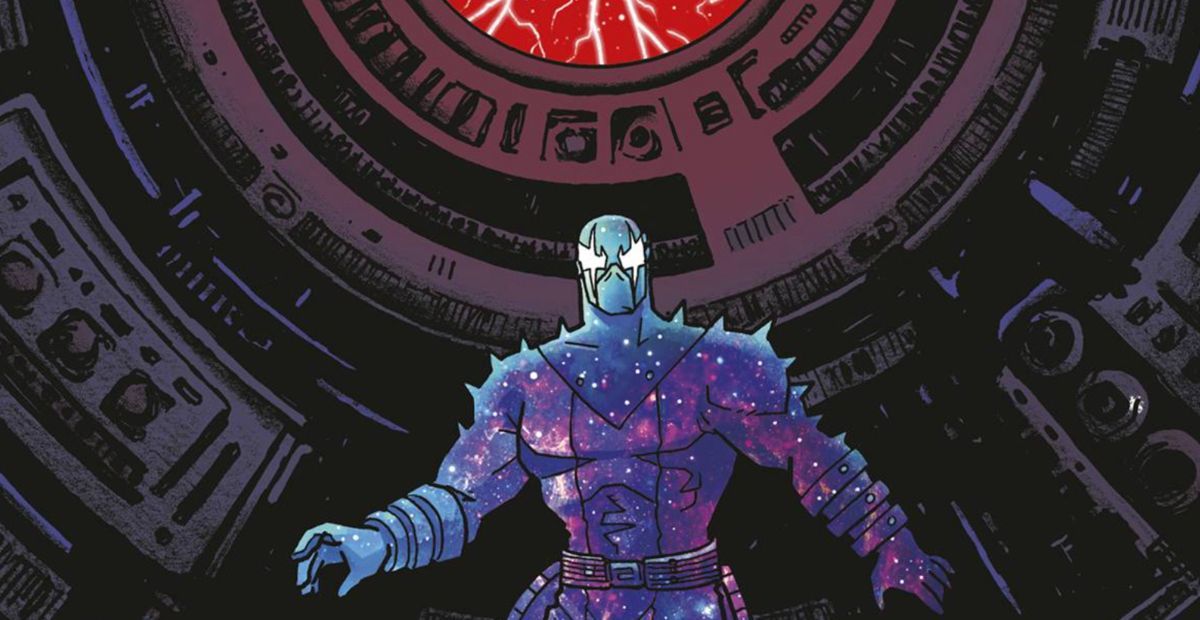Creator, writer, and artist Matt Wagner, now preparing to enter his fifth decade of Grendel stories, has crafted a comics epic that spans from Western civilization’s romantic origins to its far future, reaching the furthest projections—centuries beyond the 21st—in this week’s issue. Grendel: Devil’s Odyssey told the tale of Grendel-Prime crossing the cosmos in search of a new habitable planet for humanity’s future as society collapses amidst drastic, changing conditions on Earth. It was the sort of story that, despite the murderous cyborgs and cult-like worship of a masked crime boss, reflected very real anxieties about our planet’s future as climate change ravages ecosystems, a pandemic exacerbates social ills, and democracies crumble into authoritarianism. The heightened darkness in Grendel allows readers to appreciate genre elements amidst all-too-convincing predictions.
Videos by ComicBook.com
While the prior 7 issues focused on the nature of Grendel-Prime’s mission and the various planets he visited, each of which satirized some destructive element or ideology from modern life on Earth, Devil’s Odyssey #8 turns its attention to the odyssey’s goal: A safe and stable refuge amongst the stars.
Readers should not be surprised to find that a spacefaring, utopian civilization is unimpressed with Grendel-Prime and Earth. Wagner wisely decides to not define this utopia in his critique of mankind; there are no obvious answers to be found. However, he does position them to reflect humanity’s flaws clearly. Finding a society that is safe means finding one where violence is abhorred; quite the catch-22 for an organism at the apex of its species designed almost entirely for violence. It also rejects forms of slavery that most human beings struggle to acknowledge as Sigma-Seven (a.k.a. Siggy), Grendel-Prime’s A.I. companion, is freed from its programming. Considering the conditions imposed upon other sentient beings, artificial or animal, it quickly becomes clear that humanity seeking peace is a self-defeating quest. Grendel-Prime’s only response to his obvious inadequacies is to use violence, afterall.

For so much of Grendel: Devil’s Odyssey the focus has been outward. As civilization collapses in the first issue, the thought is to find hope amongst the stars. Yet every subsequent issue has only shown readers distorted mirrors of existing horrors. The final word in this odyssey is that space cannot save the human race. Everything ruinous from Earth is carried by Grendel-Prime as a reflection of his (surviving) humanity and can only be rejected when it finds what it is looking for.
Some may find a note of grace in this conclusion to the “hero’s journey” as Grendel-Prime directly confronts the faults that doomed his people. That’s not what Devil’s Odyssey appears to suggest, however. Learning requires change and Grendel-Prime stands as a constant through decades and even centuries. Standing at the apex of humanity, this concept that has morphed and evolved from criminal mastermind to superhuman protector also stands as a reflection of humanity. His return and the final page of Devil’s Odyssey makes this exceedingly clear.
Wagner’s ongoing exploration of human nature in Grendel comics remains every bit as compelling now as when it began. The scope, style, and even genre of those stories have changed, but Wagner’s keen eye for both visual storytelling and humanitarian critique remain. Grendel: Devil’s Odyssey managed to both provide new settings for its titular epic and updated thematic approaches for the end of the Trump era. It’s a keen work that manages to weave its entertainment with insight—cloaking a furious rebuttal to privatized spaceflights on a burning planet with stark designs and deliciously imagined scenarios, he informs us that humanity has no future, amongst the stars or anywhere else. Wagner is still capable of preparing the bitterest of pills in an enjoyable fashion, precisely why Grendel remains relevant.
Published by Dark Horse Comics
On July 28, 2021
Written by Matt Wagner
Art by Matt Wagner
Colors by Brennan Wagner
Letters by Dave Lanphear
Cover by Matt Wagner and Brennan Wagner








